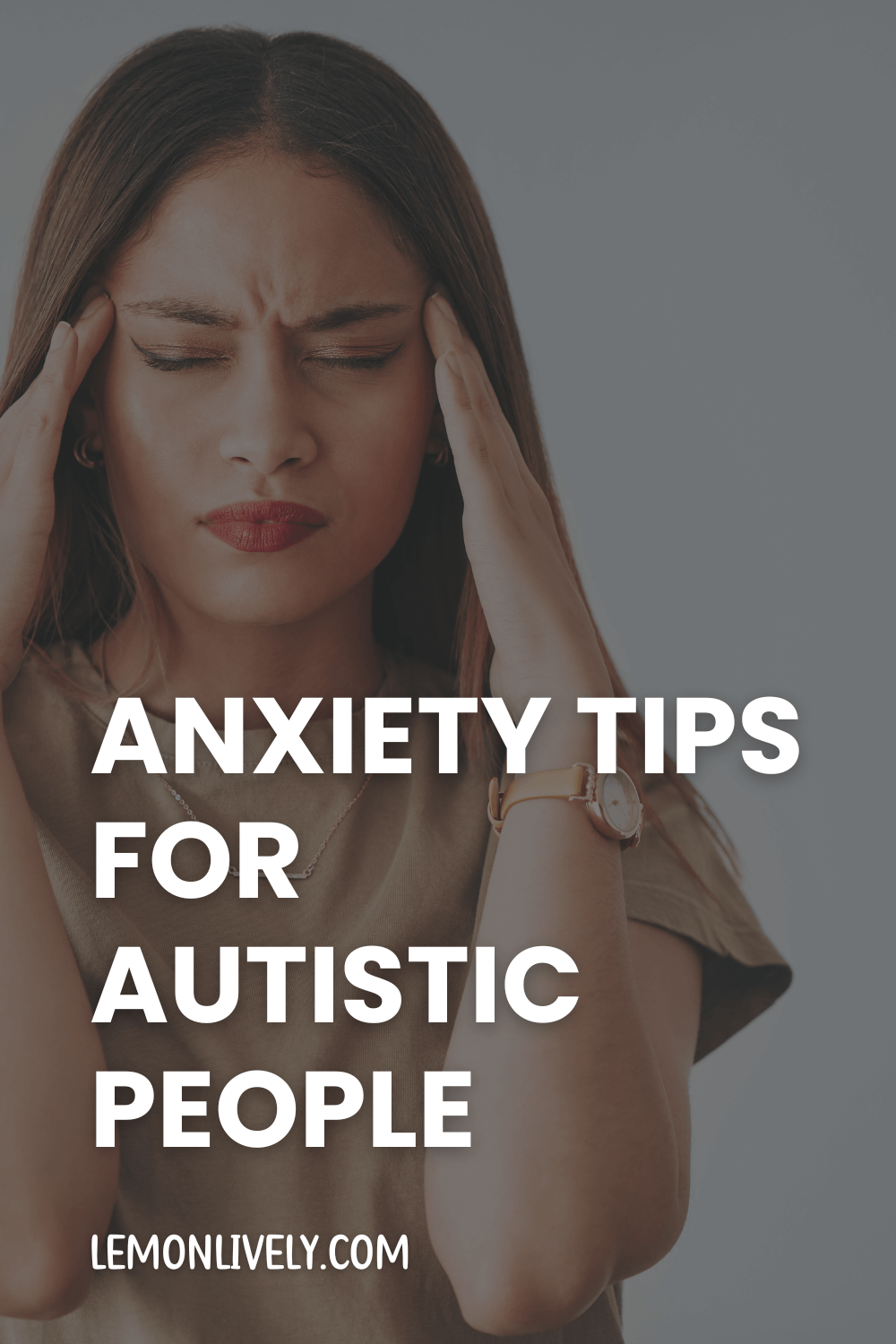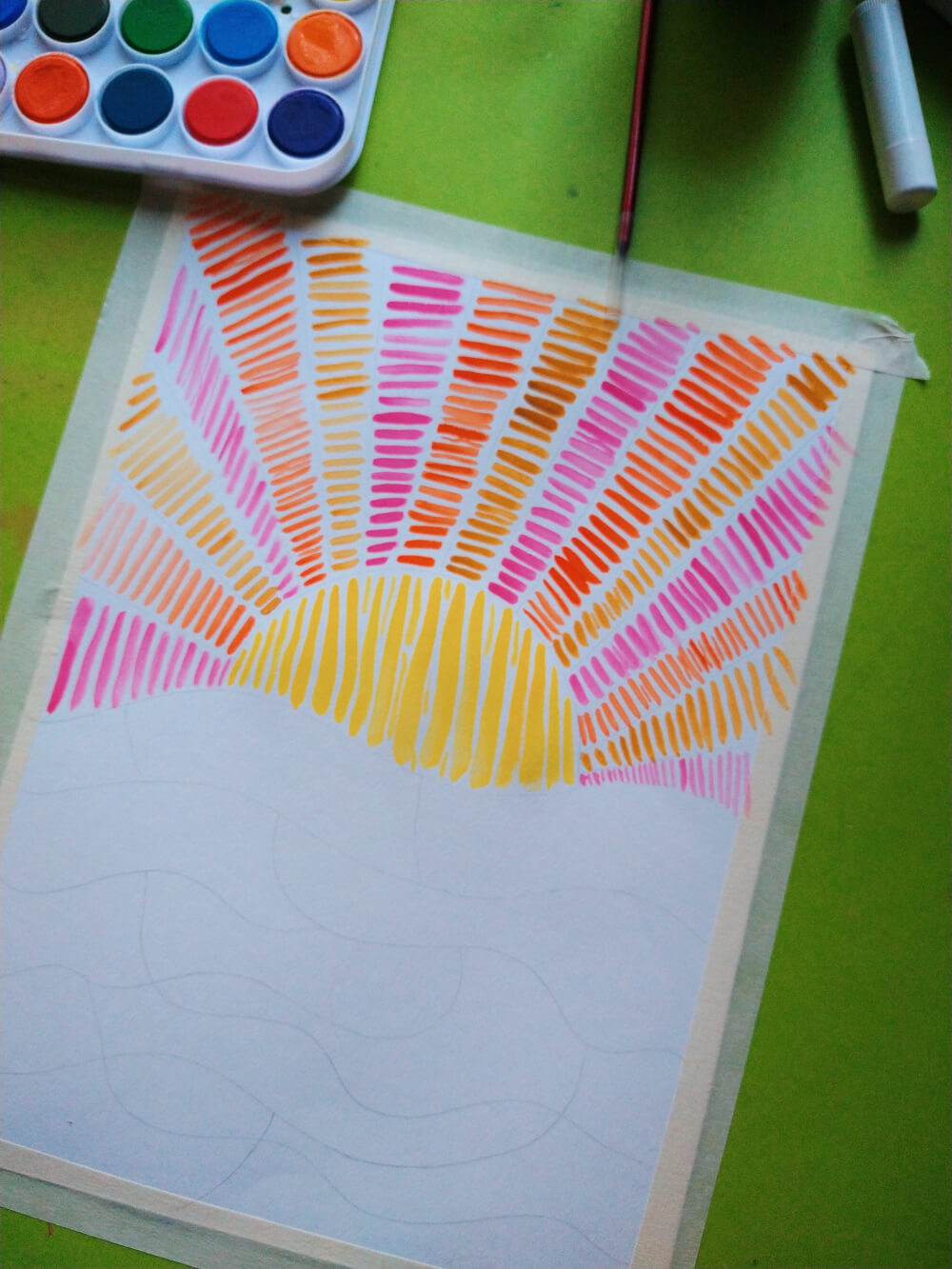Anxiety management looks different for autistic people.
Yet nearly every list of tips for managing anxiety as an autistic person has been written by a non-autistic person and suggests things that aren’t applicable to actually autistic people.
This is frustrating, since those lists aren’t helpful at all.
If you’re unfamiliar with me, I’m Jane Lively. I’m autistic and have been in severe autistic burnout. I’ve been blogging about autism for about ten years now. I write 100% of my content because I write from personal experience.
I don’t have an anxiety disorder, but you don’t need one in order to experience anxiety. These are the things that help me when I’m feeling anxious.

1. Note the early signs of anxiety
Autistic people often struggle to figure out how they’re feeling thanks to alexithymia, so recommending we recognize the early signs of anxiety is futile.
Before you can successfully recognize any signs of oncoming anxiety, you have to develop self-awareness.
Take frequent feeling audits:
- Note what you’re feeling, anything you recognize
- Track your out-of-character behaviors
- Add any notes to why you think these feelings or uncharacteristic behaviors may be happening
You might still never fully or correctly notice anxiety symptoms until you’re drenched in them. That’s okay — this is what feeling audits are for. 😏
2. Stim
Dance, shake your hands, fidget — self-stimulatory behavior is self-regulatory behavior, and there is nothing wrong with it.
3. Find a way to “reset”
I reset by standing or sitting under the shower water. I learned years ago that tilting my head downward causes the water to drip straight down instead of going down my face — so water doesn’t spill into my eyes. As long as my mouth is open, I can breathe and water won’t come in.
As autistic people, we need moments to ourselves where the world seemingly stops and life is on pause — even if it isn’t.
4. Give yourself X amount of time.
I have this rule for myself: If something is still stressing me out X hours from now, then I will give myself one hour to panic before I start brainstorming how to resolve it.
Sometimes, my mind can’t not focus on the thing worrying me so I’ll instead give myself one hour to panic.
5. Ask “What if…?”
- What if something bad happens?
- What if nothing works out?
- What if you fail?
Write or type out all the “what if…?” questions. I usually do this on a computer or my phone.
After you have all your questions, list out everything that could happen and then 1-2 things you could do in the event of those things happening.
- What if I run out of cat food before I can buy some more?
- I can feed Galaxy canned tuna or get chicken breast from the food pantry and turn it into puree.
- What if I run out of cat litter before I can buy some more?
- I can DIY my own litter out of oats and baking soda.
Sometimes there aren’t solutions. Some worries are completely rational and normal.
Temporary anxiety is a healthy reaction to danger or uncertainty.
Playing the “What if…?” game also helps give us ideas for how we can futureproof our life against uncertainty (e.g. stockpiling, having an absolutely-do-not-touch emergency fund, creating an in-the-event-of-____ plan).
6. Audit the people in your life
Secondhand stress is a thing! If you’re around people who are anxious or stressed out, you may be exposed to their airborne stress chemicals. In other words, stress is contagious.
- Who in your life seems more anxious or stressed than usual? Or is this their norm?
- How much time do you spend around them?
- How do you feel after being around them?
- How can you limit your time with/around them?
Autistic people may be hypersensitive to other people’s negative emotions, even if we struggle to respond “appropriately” to those negative emotions (e.g. comforting the allistic).
I don’t go to funerals, because I feel like all the negative energy from everyone wears off onto me and then I’m stuck dealing with that on top of my own grief — and I can’t handle it.
I feel like a sponge. I feel intensely.
Every time I spent time with certain relatives, I felt sooo anxious afterward. It negatively affected my mental health. The more time I spent away from them, the better my mental health remained.
7. Consider how people are perceiving you
Non-autistic people tend to make assumptions about autistic people that aren’t true, as if they’re fact — and they feel obligated to tell us about it.
How are other people’s perceptions of you affecting your ability to live your life well?
The difference between anxiety and not wanting to be perceived is that the latter is more of a trauma response than an anxiety one.
8. Audit your entire life
Auditing your life helps you figure out what’s working versus what’s not working so you know what changes you need to make.
I created the Autistic Burnout Journal, where you can audit your life and answer autistic-friendly journaling questions. You don’t need to be in autistic burnout to make use of it!
9. Try a meditation
Meditating does NOT only pertain to/include sitting and humming!
Drawing, painting, writing — these things are all meditations!
Watercolor painting has been sooo therapeutic for me this past year; it’s helped me learn how to let go of certain worries and imperfections. It’s helped me develop patience.

10. Consider medication.
If you have constant anxiety, it’s no longer temporary.
The biggest difference is in the answer to this question:
- Do you have days or moments where you don’t feel anxious, regardless of what happens?
And in differentiating anxiety from trauma, it’s this question:
- Can you pinpoint a previous event that causes you to worry about a similar event happening now?
Everyone deserves anxiety relief, especially when they struggle with it on a regular basis. Medication for anxiety relief may be administered temporarily whilst you go through a difficult time or for a longer time period/permanently.
Talk to your mental health professional to determine the best course of treatment for you!
Things that don’t work for autistic people
There are similar articles about this topic on the internet that recommend anxiety management strategies for autistic people that could actually make things worse!
I’m not sure if the authors used AI and thought it was good enough or thought the same tips for allistic people can work for autistics.
Either way, some strategies should not be considered for most autistic people.
Behavioral conditioning
Cognitive behavioral therapy (CBT) wasn’t created for autistic people or with autistic people in mind. It assumes someone’s thinking is wrong or disordered, which is harmful when applied to autistic people because it implies that autistic minds are wrong.
Therapists who practice CBT on autistic patients often do it because the medical community said it was okay, with zero regard for actually autistic people’s experiences.
CBT may work best for non-autistic and/or neurotypical people who don’t have a habit of gaslighting themselves. This is why CBT is bad for PTSD patients, too.
Behavioral conditioning is controversial and problematic, because it first requires the person engaging in it to determine a “norm” based on their own biases.
Applied behavioral analysis (ABA) is used to normalize autistic children, which only leads to autistic people masking.
Learning about distorted thought patterns may help autistic people better, because we often enjoy learning about how things work and apply them to our life.
Emotional Freedom Technique (EFT) tapping
EFT tapping may over-stimulate autistic people or be the complete opposite sensory input they need or can deal with.
I’ve mostly seen EFT tapping used on autistic people to stop us from stimming so our caregivers feel more comfortable, which is problematic because it’s an effort to “normalize” us.
Some solutions involve using a rubber band on your wrist, which can encourage self-harm behaviors in the long run (even if it was “supposed” to be a temporary solution).
EFT tapping was developed for neurotypical/non-autistic people, with non-autistic people in mind.
Some autistic people may respond to it, but it should not be assumed that we all will.
Talk therapy
Some autistic people may respond well to talk therapy, but it’s generally advised against as a “default” therapy recommendation because
- Autistic people often struggle to identify emotions (alexithymia) or why they did something
- Not all autistic people speak
- Speaking requires energy, which is expensive when you’re already stressed/struggling
Non-autistic people usually speak by default without being aware of what speaking will cost them. I have to mentally prepare to be speaking or at least be aware of how much energy it’s going to cost me.
The price of speaking for 40 minutes could be my inability to do anything else for the rest of the day, plus two more days.
As an autistic person, I have to
- remember to breathe, and I have asthma
- be mindful of what face I’m making/how my body looks as I speak
- pay attention to my tone of voice
- perform emotional labor so the other person doesn’t misunderstand too much
- process the environment on a sensory level
- be aware of the environment on a “regular” awareness level (e.g. potential dangers)
- process what the other person is doing
- process what I’m thinking of into what I say vs. what I don’t say
- make sure I’m speaking actual English and using words that exist, with the right meanings
and that’s only a fraction of the work I put in to speak.
I’ve been in talk therapy, and it’s exhausting due to the price of speaking and the result of therapy itself. Therapy is exhausting to non-autistic people, but not usually to the point that it affects them for days.
Recommending strategies that work on non-autistic people to autistic people without including our input needs to stop.
It’s unhelpful. It’s harmful, because our loved ones read articles on how to help us or understand us better — they apply what they read to us. And when we say, “No, that doesn’t work for autistic people,” it’s a matter of “but this article recommends it!”
And then I pull up the article and see that it wasn’t written by an autistic person at all.
I wish search engines would prioritize showing articles and posts by actually autistic people — that being autistic was perceived as a legitimate credential, more so than someone who practices ABA or isn’t even autistic themselves.
What therapy strategies help you?
Love this post?
Support me by subscribing to my blog and/or buying me a cuppa:
Leave a comment